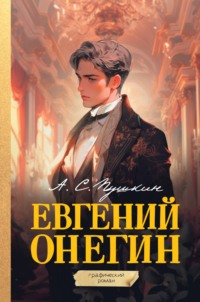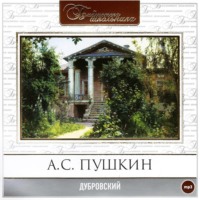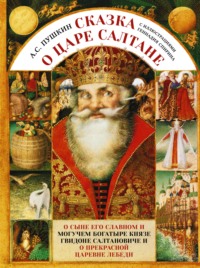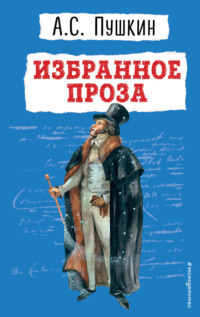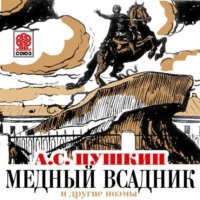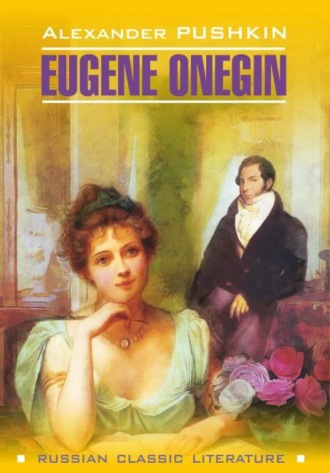
Полная версия
Евгений Онегин / Eugene Onegin
VIII
Now with what eager interestShe the delicious novel reads,With what avidity and zestShe drinks in those seductive deeds!All the creations which belowFrom happy inspiration flow,The swain of Julia Wolmar,Malek Adel and De Linar,[28]Werther, rebellious martyr bold,And that unrivalled paragon,The sleep-compelling Grandison,Our tender dreamer had enrolledA single being: ’twas in fineNo other than Onegin mine.IX
Dreaming herself the heroineOf the romances she preferred,Clarissa, Julia, Delphine[29], —Tattiana through the forest erred,And the bad book accompanies.Upon those pages she descriesHer passion’s faithful counterpart,Fruit of the yearnings of the heart.She heaves a sigh and deep intentOn raptures, sorrows not her own,She murmurs in an undertoneA letter for her hero meant:That hero, though his merit shone,Was certainly no Grandison.X
Alas! my friends, the years flit byAnd after them at headlong paceThe evanescent fashions flyIn motley and amusing chase.The world is ever altering!Farthingales, patches, were the thing,And courtier, fop, and usurerWould once in powdered wig appear;Time was, the poet’s tender quillIn hopes of everlasting fameA finished madrigal would frameOr couplets more ingenious still;Time was, a valiant general mightServe who could neither read nor write.XI
Time was, in style magniloquentAuthors replete with sacred fireTheir heroes used to representAll that perfection could desire;Ever by adverse fate oppressed,Their idols they were wont to investWith intellect, a taste refined,And handsome countenance combined,A heart wherein pure passion burnt;The excited hero in a triceWas ready for self-sacrifice,And in the final tome we learnt,Vice had due punishment awarded,Virtue was with a bride rewarded.XII
But now our minds are mystifiedAnd Virtue acts as a narcotic,Vice in romance is glorifiedAnd triumphs in career erotic.The monsters of the British MuseDeprive our schoolgirls of repose,The idols of their adorationA Vampire fond of meditation,Or Melmoth, gloomy wanderer he,The Eternal Jew or the CorsairOr the mysterious Sbogar.[30]Byron’s capricious phantasyCould in romantic mantle drapeE’en hopeless egoism’s dark shape.XIII
My friends, what means this odd digression?May be that I by heaven’s decreesShall abdicate the bard’s profession,And shall adopt some new caprice.Thus having braved Apollo’s rageWith humble prose I’ll fill my pageAnd a romance in ancient styleShall my declining years beguile;Nor shall my pen paint terriblyThe torment born of crime unseen,But shall depict the touching sceneOf Russian domesticity;I will descant on love’s sweet dream,The olden time shall be my theme.XIV
Old people’s simple conversationsMy unpretending page shall fill,Their offspring’s innocent flirtationsBy the old lime-tree or the rill,Their Jealousy and separationAnd tears of reconciliation:Fresh cause of quarrel then I’ll find,But finally in wedlock bind.The passionate speeches I’ll repeat,Accents of rapture or despairI uttered to my lady fairLong ago, prostrate at her feet.Then they came easily enow,My tongue is somewhat rusty now.XV
Tattiana! sweet Tattiana, see!What bitter tears with thee I shed!Thou hast resigned thy destinyUnto a ruthless tyrant dread.Thou’lt suffer, dearest, but before,Hope with her fascinating powerTo dire contentment shall give birthAnd thou shalt taste the joys of earth.Thou’lt quaff love’s sweet envenomed stream,Fantastic images shall swarmIn thy imagination warm,Of happy meetings thou shalt dream,And wheresoe’er thy footsteps err,Confront thy fated torturer!XVI
Love’s pangs Tattiana agonize.She seeks the garden in her need —Sudden she stops, casts down her eyesAnd cares not farther to proceed;Her bosom heaves whilst crimson huesWith sudden flush her cheeks suffuse,Barely to draw her breath she seems,Her eye with fire unwonted gleams.And now ’tis night, the guardian moonSails her allotted course on high,And from the misty woodland nighThe nightingale trills forth her tune;Restless Tattiana sleepless layAnd thus unto her nurse did say:XVII
“Nurse, ’tis so close I cannot rest.Open the window – sit by me.”“What ails thee, dear?” – “I feel depressed.Relate some ancient history.”“But which, my dear? – In days of yoreWithin my memory I boreMany an ancient legend whichIn monsters and fair dames was rich;But now my mind is desolate,What once I knew is clean forgot —Alas! how wretched now my lot!”“But tell me, nurse, can you relateThe days which to your youth belong?Were you in love when you were young?” —XVIII
“Alack! Tattiana,” she replied,“We never loved in days of old,My mother-in-law who lately died[31]Had killed me had the like been told.”“How came you then to wed a man?” —“Why, as God ordered! My IvanWas younger than myself, my light,For I myself was thirteen quite;[32]The matchmaker a fortnight sped,Her suit before my parents pressing:At last my father gave his blessing,And bitter tears of fright I shed.Weeping they loosed my tresses long[33]And led me off to church with song.”XIX
“Then amongst strangers I was left —But I perceive thou dost not heed – ”“Alas! dear nurse, my heart is cleft,Mortally sick I am indeed.Behold, my sobs I scarce restrain – ”“My darling child, thou art in pain. —The Lord deliver her and save!Tell me at once what wilt thou have?I’ll sprinkle thee with holy water. —How thy hands burn!” – “Dear nurse, I’m well.I am – in love – you know – don’t tell!”“The Lord be with thee, O my daughter!” —And the old nurse a brief prayer saidAnd crossed with trembling hand the maid.XX
“I am in love,” her whispers tellThe aged woman in her woe:“My heart’s delight, thou art not well.” —Конец ознакомительного фрагмента.
Текст предоставлен ООО «ЛитРес».
Прочитайте эту книгу целиком, купив полную легальную версию на ЛитРес.
Безопасно оплатить книгу можно банковской картой Visa, MasterCard, Maestro, со счета мобильного телефона, с платежного терминала, в салоне МТС или Связной, через PayPal, WebMoney, Яндекс.Деньги, QIWI Кошелек, бонусными картами или другим удобным Вам способом.
Примечания
1
Ruslan and Liudmila, the title of Pushkin’s first important work, written 1817–1820. It is a tale relating the adventures of the knight-errant Ruslan in search of his fair lady Liudmila, who has been carried off by a kaldoon, or magician.
2
Written in Bessarabia.
3
In Russia foreign tutors and governesses are commonly styled “monsieur” or “madame”.
4
Les Aventures du Chevalier de Faublas, a romance of a loose character by Jean Baptiste Louvet de Couvray (1760–1797), famous for his bold oration denouncing Robespierre, Marat and Danton.
5
À la “Bolivar”, from the founder of Bolivian independence.
6
M. Breguet, a celebrated Parisian watchmaker – hence a slang term for a watch.
7
Talon, a famous St. Petersburg restaurateur.
8
Paul Petrovitch Kaverine, a friend for whom Pushkin in his youth appears to have entertained great respect and admiration. He was an officer in the Hussars of the Guard, and a noted “dandy” and man about town.
9
Denis Von Wisine (1741–1792), a favourite Russian dramatist. His first comedy The Brigadier, procured him the favour of the second Catherine. His best, however, is the Minor (Niedorosl). Prince Potemkin, after witnessing it, summoned the author, and greeted him with the exclamation, “Die now, Denis!” In fact, his subsequent performances were not of equal merit; Jacob Borissovitch Kniajnine (1742–1791), a clever adapter of French tragedy; Simeonova, a celebrated tragic actress, who retired from the stage in early life and married a Prince Gagarine; Ozeroff, one of the best-known Russian dramatists of the period; he possessed more originality than Kniajnine. Oedipus in Athens, Fingal, Demetrius Donskoi, and Polyxena, are the best known of his tragedies; Katenine translated Corneille’s tragedies into Russian; Didelot, sometime Director of the ballet at the Opera at St. Petersburg.
10
Istomina – a celebrated Circassian dancer of the day, with whom the poet in his extreme youth imagined himself in love.
11
In Russia large fires are lighted in winter time in front of the theatres for the benefit of the menials, who, considering the state of the thermometer, cannot be said to have a jovial time of it. But in this, as in other cases, “habit” alleviates their lot, and they bear the cold with a wonderful equanimity.
12
“Tout le monde sut qu’il (Grimm) mettait du blanc; et moi, qui n’en croyait rien, je commencai de le croire, non seulement par l’embellissement de son teint, et pour avoir trouvé des tasses de blanc sur la toilette, mais sur ce qu’entrant un matin dans sa chambre, je le trouvais brossant ses ongles avec une petite vergette faite exprès, ouvrage qu’il continua fièrement devant moi. Je jugeai qu’un homme qui passe deux heures tous les matins à brosser ses ongles peut bien passer quelques instants à remplir de blanc les creux de sa peau”. (Confessions de J. J. Rousseau)
13
Refers to Dictionary of the Academy, compiled during the reign of Catherine II under the supervision of Lomonossoff.
14
Elvine, or Elvina, was not improbably the owner of the seductive feet apostrophized by the poet, since, in 1816, he wrote an ode, “To Her,” which commences thus: “Elvina, my dear, come, give me thine hand,” and so forth.
15
The milkmaid from the Okhta villages, a suburb of St. Petersburg on the right bank of the Neva chiefly inhabited by the labouring classes.
16
The midsummer nights in the latitude of St. Petersburg are a prolonged twilight.
17
Refers to Mouravieff’s Goddess of the Neva. At St. Petersburg the banks of the Neva are lined throughout with splendid granite quays.
18
A street running parallel to the Neva, and leading from the Winter Palace to the Summer Palace and Garden.
19
The poet was, on his mother’s side, of African extraction, a circumstance which perhaps accounts for the southern fervour of his imagination. His great-grandfather, Abraham Petrovitch Hannibal, was seized on the coast of Africa when eight years of age by a corsair, and carried a slave to Constantinople. The Russian Ambassador bought and presented him to Peter the Great who caused him to be baptized at Vilnius. Subsequently one of Hannibal’s brothers made his way to Constantinople and thence to St. Petersburg for the purpose of ransoming him; but Peter would not surrender his godson who died at the age of ninety-two, having attained the rank of general in the Russian service.
20
Refers to two of the most interesting productions of the poet. The former line indicates the Prisoner of the Caucasus, the latter, The Fountain of Baktchiserai. The Salguir is a river of the Crimea.
21
The barshtchina was the corvee, or forced labour of three days per week rendered previous to the emancipation of 1861 by the serfs to their lord. The obrok was a species of poll-tax paid by a serf, either in lieu of the forced labour or in consideration of being permitted to exercise a trade or profession elsewhere. Very heavy obroks have at times been levied on serfs possessed of skill or accomplishments, or who had amassed wealth; and circumstances may be easily imagined which, under such a system, might lead to great abuses.
22
From the lay of the Russalka, mermaid of the Dnieper.
23
The serfs destined for military service used to have a portion of their heads shaved as a distinctive mark.
24
The foregoing stanza requires explanation. Russian pancakes or “blinni” are consumed vigorously by the lower orders during the Carnival. At other times it is difficult to procure them, at any rate in the large towns. The Russian peasants are childishly fond of whirligigs, which are also much in vogue during the Carnival. “Christmas Carols” is not an exact equivalent for the Russian phrase. “Podbliudni pessni,” are literally “dish songs,” or songs used with dishes (of water) during the “sviatki” or Holy Nights, which extend from Christmas to Twelfth Night, for purposes of divination. Reference will again be made to this superstitious practice, which is not confined to Russia.
“Song and dance,” the well-known “khorovod,” in which the dance proceeds to vocal music.
“Lovage,” the Levisticum officinalis, is a hardy plant growing very far north, though an inhabitant of our own kitchen gardens. The passage containing the reference to the three tears and Trinity Sunday was at first deemed irreligious by the Russian censors, and consequently expunged.
Kvass is of various sorts: there is the common kvass of fermented rye used by the peasantry, and the more expensive kvass of the restaurants, iced and flavoured with various fruits.
The final two lines refer to the “Tchin,” or Russian social hierarchy. There are fourteen grades in the Tchin assigning relative rank and precedence to the members of the various departments of the State, civil, military, naval, court, scientific and educational. The military and naval grades from the 14th up to the 7th confer personal nobility only, whilst above the 7th hereditary rank is acquired. In the remaining departments, civil or otherwise, personal nobility is only attained with the 9th grade, hereditary with the 4th.
25
A play upon the word “venetz,” crown, which also signifies a nimbus or glory, and is the symbol of marriage from the fact of two gilt crowns being held over the heads of the bride and bridegroom during the ceremony. The literal meaning of the passage is therefore: his earthly marriage was dissolved and a heavenly one was contracted.
26
The fortress of Otchakoff was taken by storm on the 18th December 1788 by a Russian army under Prince Potemkin. Thirty thousand Turks are said to have perished during the assault and ensuing massacre.
27
Svetlana, a short poem by Joukovski, upon which his fame mainly rests. Joukovski was an unblushing plagiarist. Many eminent English poets have been laid under contribution by him, often without going through the form of acknowledging the source of inspiration. Even the poem in question cannot be pronounced entirely original, though its intrinsic beauty is unquestionable. It undoubtedly owes its origin to Burger’s poem Leonora, which has found so many English translators. Not content with a single development of Burger’s ghastly production the Russian poet has directly paraphrased Leonora under its own title, and also written a poem Liudmila in imitation of it. The principal outlines of these three poems are as follows: A maiden loses her lover in the wars; she murmurs at Providence and is vainly reproved for such blasphemy by her mother. Providence at length loses patience and sends her lover’s spirit, to all appearances as if in the flesh, who induces the unfortunate maiden to elope. Instead of riding to a church or bridal chamber the unpleasant bridegroom resorts to the graveyard and repairs to his own grave, from which he has recently issued to execute his errand. It is a repulsive subject. Svetlana, however, is more agreeable than its prototype Leonora, inasmuch as the whole catastrophe turns out a dream brought on by “sorcery,” during the “sviatki” or Holy Nights (see Canto V. st. x), and the dreamer awakes to hear the tinkling of her lover’s sledge approaching. “Svetlana” has been translated by Sir John Bowring.
28
The heroes of two romances much in vogue in Pushkin’s time: the former by Madame Cottin, the latter by the famous Madame Krudener. The frequent mention in the course of this poem of romances once enjoying a European celebrity but now consigned to oblivion, will impress the reader with the transitory nature of merely mediocre literary reputation. One has now to search for the very names of most of the popular authors of Pushkin’s day and rummage biographical dictionaries for the dates of their births and deaths. Yet the poet’s prime was but fifty years ago, and had he lived to a ripe old age he would have been amongst us still. He was four years younger than the late Mr. Thomas Carlyle. The decadence of Richardson’s popularity amongst his countrymen is a fact familiar to all.
29
Referring to Richardson’s Clarissa Harlowe, La Nouvelle Héloïse, and Madame de Stael’s Delphine.
30
Melmoth, a romance by Maturin, and Jean Sbogar, by Ch. Nodier. The Vampire, a tale published in 1819, was erroneously attributed to Lord Byron. Salathiel; the Eternal Jew, a romance by Geo. Croly.
31
A young married couple amongst Russian peasants reside in the house of the bridegroom’s father till the “tiaglo,” or family circle is broken up by his death.
32
Marriages amongst Russian serfs used formerly to take place at ridiculously early ages. Haxthausen asserts that strong hearty peasant women were to be seen at work in the fields with their infant husbands in their arms. The inducement lay in the fact that the “tiaglo” (see previous note) received an additional lot of the communal land for every male added to its number, though this could have formed an inducement in the southern and fertile provinces of Russia only, as it is believed that agriculture in the north is so unremunerative that land has often to be forced upon the peasants, in order that the taxes, for which the whole Commune is responsible to Government, may be paid. The abuse of early marriages was regulated by Tsar Nicholas.
33
Courtships were not unfrequently carried on in the larger villages, which alone could support such an individual, by means of a “svakha,” or matchmaker. In Russia unmarried girls wear their hair in a single long plait or tail, “kossa;” the married women, on the other hand, in two, which are twisted into the head-gear.





